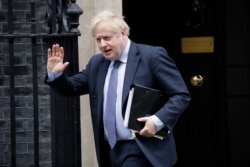Britain and the European Union began crucial talks this week on their future trading relationship after the Brexit transition period ends December 31, leaving less than 10 months for the two sides to negotiate and ratify any deal. On the same day as the talks began, Britain published its negotiating position for a trade agreement with the United States. London hopes the parallel discussions will give it leverage in negotiations with Europe.
Prime Minister Boris Johnson promised to ‘drive a hard bargain’ with the United States as Britain published its mandate, pledging a boost for both economies as Britain traded “salmon for Stetson hats.”
Beyond the stereotypes, Britain wants to open up markets in areas like car manufacturing, professional services such as law and architecture, artificial intelligence, big data and food processing. Formal negotiations are expected to begin later this month.
The best-case scenario is a $19 billion boost for the British economy over the next 15 years or 0.16 per cent of GDP, according to government figures.
“That's 0.1 or 0.2 percent you wouldn't otherwise have, so that's fine,” says trade expert David Henig of the European Center for International Political Economy. “I think President Trump said it might double or triple U.S.-U.K. trade. That was unrealistic,” he said.
However, the government’s forecast also suggests Brexit will cost the economy far more – around $168 billion or 6.7 % of GDP growth, even with the type of trade deal envisaged by Boris Johnson.
“For the UK, the EU is our largest market. It's approximately 50% of our trade and whilst deals with the U.S. or Australia can help a little bit, nothing will really replace that,” said Henig.
Britain has also ruled out opening up key areas of its economy to the United States.
“It goes without saying that the NHS (National Health Service) is not on the table. And we will not accept any diminution in food, hygiene or animal welfare standards,” Prime Minister Johnson said recently.
The United States may have other ideas. U.S. Trade Representative Robert Lighthizer told an event at Britain’s Oxford University Monday that he hoped Britain “doesn’t just adopt European standards” on agriculture, such as banning the practice of washing chicken in chlorine or giving cattle growth hormones, and said he expected U.S. companies to be able to access the healthcare market. Lighthizer said he believed both sides could overcome these differences and strike a trade deal.
Ultimately, the politics of a deal could trump the economics, said analyst David Henig.
“I think both Prime Minister Johnson and President Trump want to see a deal and are less concerned about what might be in that deal. President Trump is obviously running into a re-election campaign and having a UK deal which will be pretty popular, I think, across the U.S., would be a good way to go into that. Prime Minister Johnson wants to show ‘global Britain’ and again a U.S. deal will do that, particularly if it doesn't really include the NHS or food standards,” he said.
Britain hopes that opening parallel talks with the U.S. and Europe will give it leverage on both sides. London wants to model its EU deal on the bloc’s recent trade agreement with Canada. That agreement took seven years and eliminated 99% of tariffs on goods but not on services, which make up 80% of the British economy.
However, the EU says Britain is very different to Canada due to its proximity and much closer economic ties, so there is a bigger risk that Britain could undercut Europe. France is taking the toughest line in negotiations.
“Just like you, as a sovereign power, we decide how we want to trade with third countries and as you, we will not trade away our sovereignty and our autonomy of decision in a UK-EU deal,” French Secretary of State for European Affairs Amélie de Montchalin said at a recent event at London’s Chatham House.
Britain insists quick deals with both the United States and the European Union are possible. The danger is it could leave the Brexit transition period in ten months’ time with no trade agreements at all.






